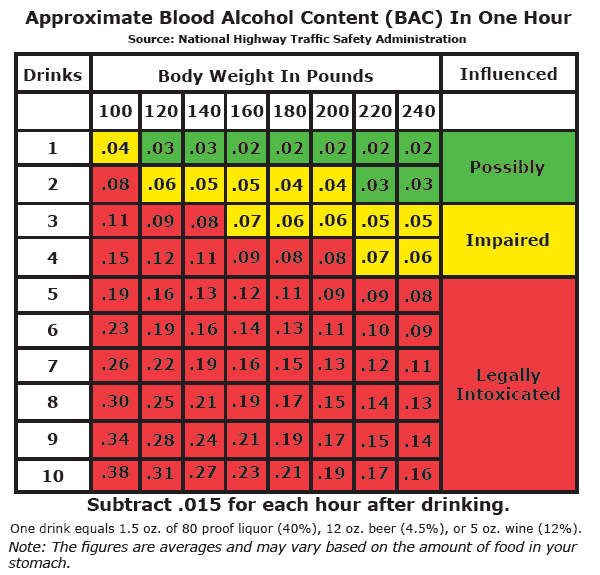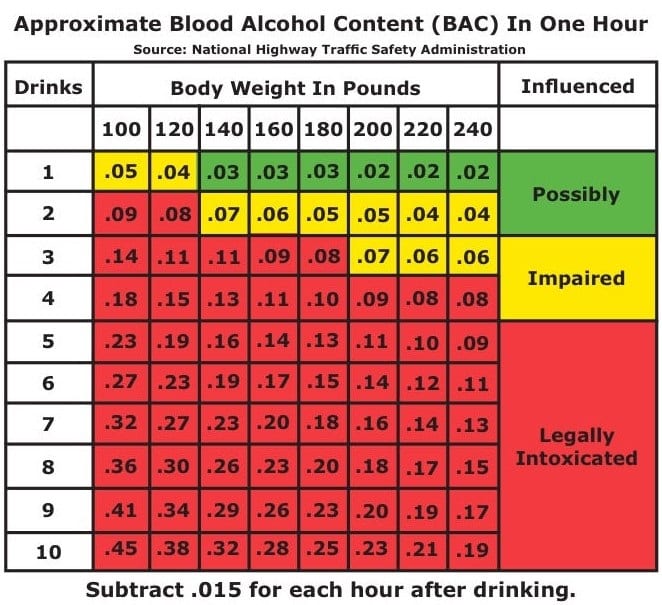The Lone Star State is tough on crime of all kinds, but where do we stand on drunk driving? What is the legal alcohol limit for driving in Texas? And what kinds of penalties can you expect if you’re caught driving above it?
We should begin by telling you that although driving drunk is illegal in Texas, drinking and driving technically is not. We know that sounds strange, but if you’re on the road after drinking, and your blood alcohol content (BAC) is below the legal limit, you’re technically not doing anything illegal.
The system is not perfect, however, as the police aren’t always the most reliable when it comes to their science, and they have been known to make arrests first and ask questions later.
This is why Mark Thiessen, quadruple board certified DWI attorney and ACS-CHAL Forensic Lawyer-Scientist, is here to talk about the legal limit in Texas, including answering common questions and walking you through the science. Where does this magic .08% number come from? How can you estimate your own BAC? What affects your BAC?
Keep reading to find the answers to these questions about the legal alcohol limit and more. If you’ve been arrested under suspicion of DWI in Texas, contact Thiessen Law Firm for winning defense at (713) 864-9000 today.
What is the legal alcohol limit in Texas?
What is the highest legal alcohol limit to drive? Per Texas law, it is illegal for individuals aged 21 and above to operate a motor vehicle with a BAC of 0.08% or higher. This means that if a driver’s BAC level is at or above 0.08%, they are considered legally intoxicated, and driving under such conditions can result in severe penalties.
While the legal limit for driving in Texas is .08% for most people, there are a few exceptions to the rule, the specifics of which we will get into later. These exceptions include:
- Anyone under the age of 21
- Commercial drivers holding a CDL license
What is a 0.8 alcohol level?
Myths and misconceptions abound about the legal alcohol driving limits in Texas. From incorrect information about underage drinking rules to choosing between alcohol blood tests vs breathalyzers, confusion can come from anywhere.
The science behind the numbers
One of the most common misconceptions starts with the .08 blood alcohol content figure because it doesn’t mean that your BAC limit is 8% or .08 mathematically. Instead, if we were to mathematically compute it, the percentage actually means .0008. To arrive at these figures, your BAC is calculated by dividing the number of milliliters of alcohol per 100 milliliters of blood. So in layman’s terms, it doesn’t take much alcohol to get anyone drunk, by legal limits.
In fact, any blood alcohol level of 0.3% to 0.4% or greater is generally considered fatal. While .08% is fairly easy to reach, it’s impossible for you to survive or even reach a blood alcohol level of 8%. And if, by some miracle, you did… well, let’s just say that DWI probation or a DWI license suspension in Texas would then be the least of your worries.
As you can see, there can be a huge difference between the perceived and actual Texas legal alcohol driving limits. A .08% BAC level is the point at which a driver is no longer driving responsibly and is likely to put their life and other people’s lives in danger by tailgating, driving off the road, making illegal turns, driving erratically, or nodding off.
How much is “one drink” of alcohol, exactly?
Now, it’s worth noting that not all drinks are equal. “One drink” can mean a lot of things, but for the estimates above, one drink stands for 1.5 oz. of 80-proof liquor (40%), 12 oz. beer (4.5%) or 5 oz. wine (12%). In other words, one drink with two shots or 3 oz. of liquor in a cup would not be considered “one drink,” but two.
Most people reach a .08% BAC level if they drink between 2 and 3 drinks per hour. At 2 drinks per hour, you’re most likely impaired; at 3 drinks per hour, you face a very high risk of being legally intoxicated. However, adults who weigh over 100 pounds can drink approximately 1 drink per hour and still drive.
Now you know why questions like, “How much alcohol can you drink before you drive?” or, “How many beers is the legal limit in Texas?” are tricky to answer.
And these aren’t the only sources of confusion. While chemical tests for BAC content are relatively accurate, your blood alcohol content rises and falls quite rapidly, and the margin for error in administering these tests is paper-thin. Neither BAC tests or standardized sobriety tests are engineered or administered for 100% accuracy, but rather to make it easier for the police to arrest you and put you behind bars.
Continue reading: Are field sobriety tests accurate?
What is the legal alcohol limit under 21 in Texas?
Texas has a zero-tolerance policy for underage drinking and driving. For drivers under the age of 21, it is illegal to operate a motor vehicle with any detectable amount of alcohol in their system. This means that if you’re under 21, asked to take a breath test, and blow anything over 0 (zilch, nada), then you’re probably looking at getting a driver’s license suspension at the very least.
But can’t you drink under 21 in Texas if you’re with a parent?
Yes, you can drink under the age of 21 if you’re with a parent. You can even drink in a restaurant, so long as your parent purchases the alcoholic beverage and stays with you while you drink. But if you’re under 21 and your mom or dad lets you have a beer, a glass of wine, or a cocktail, don’t even think about getting behind the wheel.
What is the legal alcohol limit in Texas for commercial drivers?
Standards for commercial drivers are much more strict in Texas, and the legal alcohol limit for driving is no different. The legal limit for CDL holders in Texas is .04%, half that of the legal limit for non-commercial drivers.
The limit is lower for CDL holders because there is a lot more responsibility and danger involved in operating large commercial vehicles compared to personal ones, and the penalties are even steeper as a result:
- The .04 limit applies all the time. It doesn’t matter whether you are driving your commercial or company vehicle.
- Officers must have probable cause for Texas field sobriety tests for non-commercial drivers. However, commercial drivers are bound by US Department of Transportation regulations that could subject commercial drivers to “random” BAC tests.
- Fighting a DWI is high stakes for every citizen; however, a DWI threatens the means of living for commercial drivers. For example, an ALR hearing in Houston could almost be life and death for a CDL holder and their family.
Alcohol legal limit chart
So, how long after drinking can you drive? While that is incredibly hard to say, the National Highway Traffic Safety Administration uses these charts to help you estimate. The first chart is intended to be used by men and the second by women.


As much as we like charts and data, several other factors such as weight, genetics, depression, diabetes, high blood pressure, blood volume and muscle mass can all affect how your body is able to metabolize alcohol. There are also many medicines that don’t mix with alcohol.* The best way to avoid drunk driving (after not drinking) is to know your body, limit your alcohol intake and have a plan.
Our advice?
- Designate a driver who will not drink (a DD)
- Save a taxi number in your phone or download Uber or Lyft and add your credit card information beforehand, so you don’t have to do so after a few drinks
- Charge your phone fully
- Check your medication for potential side effects of drinking
- Eat a substantial, well-balanced meal and consider eating snacks while drinking
- Drink plenty of water before you go out and while drinking
- Know DWI laws, including the open container laws in Texas
- Know what to expect from Texas Field Sobriety Tests, alcohol blood tests and breathalyzer tests
Continue reading: What prescription drugs can you not drive on?
DWI penalties in Texas
Penalties for driving above the legal limit in Texas will vary greatly depending on the circumstances of your offense. There are a number of different DWI charges with penalties that vary based on the severity of the charge. A breakdown of these penalties is as follows:
| Offense | Charge | Fine | Jail Time |
| First-offense DWI | Class B misdemeanor | Up to $2,000 | 3 – 180 days |
| Second-offense DWI | Class A misdemeanor | Up to $4,000 | 30 days – 2 years |
| Subsequent DWI charges | Felony charge | Up to $10,000 | 2 – 10 years |
| First-time DWI w/ BAC 0.15% or higher | Class A misdemeanor | Up to $4,000 | Up to 1 year |
| First-time aggravated DWI w/ child passenger | State jail felony | Up to $10,000 | 180 days – 2 years |
| Aggravated DWI with prior conviction(s) | Third-degree felony | Up to $10,000 | 2 – 10 years |
| Intoxication Assault | Third-degree felony | Up to $10,000 | 2 – 10 years |
| Intoxication Manslaughter | Second-degree felony | Up to $10,000 | 2 – 20 years |
You’ll be facing steep penalties no matter which DWI offense you are charged with when caught driving over the legal limit. Even the least severe of these charges will require paying a lot of money to an attorney, possibly taking alcohol education classes, and secondary punishments like ignition interlock devices, not to mention the probable jail time and steep fines.
Not everything can be planned for, and the legal alcohol limit is not a perfect system — did you know that there is no established legal limit for driving high? But you can rest assured knowing that the criminal attorneys are here to catch you when you fall, and defend your freedom with everything we’ve got.
Caught above the legal alcohol limit for driving? Call Thiessen Law Firm for help.
Although breaking the legal alcohol limit for driving may be a lot easier than people think, with an experienced Houston DWI attorney by your side, getting caught over the limit doesn’t have to turn into a catastrophe.
Mark Thiessen is the only attorney in America who is board certified in:
- Criminal Law by the Texas Board of Legal Specialization
- DUI Defense by the National College for DUI Defense as approved through the American Bar Association
- DUI Law by the DUI Defense Lawyers Association
- Board Certified Advocate in Criminal Trial Law by the NBTA Foundation
Mark has been making miracles happen for his clients accused of DWI in Houston for decades, and he is ready to defend you, too.
If you’ve been arrested for driving over the legal limit and want the best DWI attorney Houston has to offer by your side, call Thiessen Law Firm today at (713) 864-9000 or contact us online to schedule a consultation.
More Helpful Articles by Thiessen Law Firm:
- SCRAM Bracelets & False Positives in Texas
- Is Resisting Arrest a Felony in Texas?
- Can You Be Deported for a DWI?
- How To Get a DWI off Your Record in Texas
- DWI Probation in Texas: First-Time Offenses, Requirements, and Early Release

